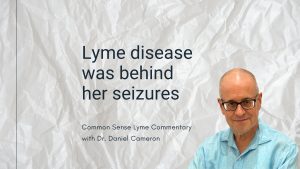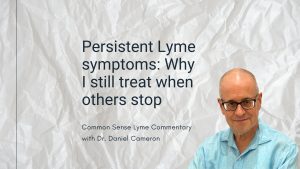Call for your appointment today 914-666-4665 | Mt. Kisco, New York

Welcome to another selection from my book “An Expert’s Guide on Navigating Lyme disease.” The book highlights the findings of my first 600 Lyme disease Science blogs. In this episode, I will discuss doctor and patient Lyme frustration.
A doctor’s perspective when his son was diagnosed with Lyme.
A researcher from the University of Pennsylvania shares his story. “One day, when traveling in California for a meeting, I received a call informing me that one of my sons, then aged 39, had been walking his dog when he collapsed into unconsciousness with a heart rate of 35/minute and had been taken to a local hospital,” wrote Plotkin (2018). A Lyme infection was suspected. His son was diagnosed immediately by a cardiologist familiar with Lyme disease. “My son Alec received a pacemaker and, of course, an intravenous antibiotic. Fortunately, he has recovered, but his experience convinced me that a cavalier attitude towards Lyme infection is misplaced” (Plotkin 2018). Read more.
Doctors expressed their frustration with treating Lyme.
“According to a survey, one-third of general practitioners experience difficulty when faced with the ‘insistent’ demands of ‘hyper-informed’ patients. Lyme disease was ruled out” (Raffetin et al., 2021). Problems may lie in the lack of education. “The patients highlighted the poor training of physicians regarding persistent symptoms, as has also been shown in several studies on somatic symptom disorders.” “These results are consistent with the views of the [general practitioners] interviewed, 87% of whom said they were uncomfortable following up with patients who had symptoms after a full course of antibiotics due to having failed to provide codified management” (Lisowski et al., 2016).
Read more.
Individuals shared their frustrations with Lyme.
Lyme disease patients and their doctors’ perceptions and experiences were explored in a paper in Microorganisms (Raffetin et al., 2021). • “Nothing could bring me relief …, the pain was almost unbearable.” • “Always tired, tired … tired, tired.” • “We kept doing the analyses; we didn’t understand.” • “Patients expressed a feeling of fear of unpredictable flare-ups, of not being cured.” • “I was afraid of not knowing how I would end up.” • “They don’t listen … they look at everything medical, and as long as the tests are negative, they say that you have nothing.” Read more.
[bctt tweet=”“A feeling of abandonment by the scientific community.”” username=”DrDanielCameron”]
Other frustrations with Lyme.
“The absence of consensus on recommendation has reinforced the feeling of abandonment by the scientific community.” “Patients reported work absences linked to multiple medical consultations, and repeated leave.” “Activities were impacted by symptom unpredictability, leading to the feeling of being overwhelmed by the disease.” “The patients described either a lack of understanding from their relatives or unconditional support, sometimes with the family adapting to their condition” (Raffetin et al., 2021). Read more.
Some patients are told they do not have Lyme.
Many patients may initially be told they do not have Lyme disease. “After contact with a number of patients, I can state that not infrequently, patients with suspected Lyme borreliosis with no pathological findings in cerebrospinal fluid are told that they do not have Lyme neuroborreliosis, nor any other form of Lyme borreliosis that can be treated with antibiotics” (Bjark 2019). Patients should still be treated. “If they are left untreated, it is impossible to know whether these are patients who would profit from standard, targeted antibiotic therapy” (Bjark 2019). “Based on my long experience with a large number of Lyme borreliosis cases, I believe that each patient must be assessed individually. By failing to do this, we do many patients an injustice” (Bjark 2019). Read more.
Cancer patients expressed the same frustration.
Both Lyme disease doctors and their patients can get frustrated. They are not alone. Hardavella et al. (2017) described similar frustrations for patients with cancer. Examples of patient frustrations with their doctor include: • “Delivering difficult news (e.g., a life-changing diagnosis) without showing empathy or ensuring appropriate is support available for the patient (e.g., counseling services or caregivers/family members around).” • “During a consultation, uses poor nonverbal communication (e.g., no eye contact with the patient, instead focusing solely on the computer screen or notes; stance; gestures; or tone of voice).” • “Speaks ambiguously, not explaining, in plain language, long-term management plans, or the importance or implications of diagnosis.” Read more.
Doctors share their frustrations.
Examples of doctors’ frustrations with their patients include: • Researching online about their ailments and being convinced by their findings of a conclusion and demanding specific investigations/treatments. • Feeling unheard and may become frustrated or threaten legal action or social media involvement. • “Not accepting the doctor’s diagnosis or test results and demanding a second opinion. • Symptoms affect their quality of life, but no diagnosis despite thorough workups by various medical teams, leading to frustration or a lack of trust in medical professionals. • Focusing on what went wrong rather than the best way to progress care (Hardavella et al., 2017). Read more.



